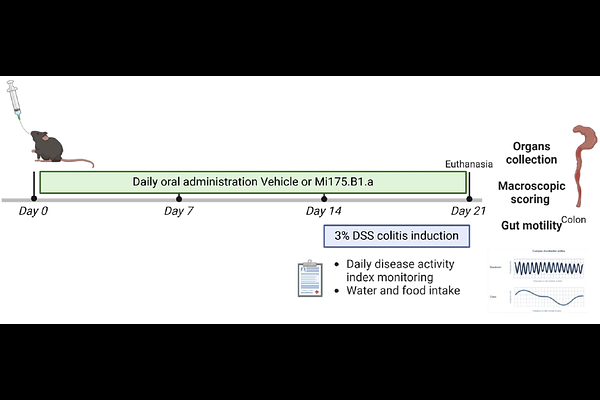Impact of a standardized Tetradesmus obliquus Mi175.B1.a extract on gut function and physiology in inflammatory conditions: in vitro and in vivo insights

Impact of a standardized Tetradesmus obliquus Mi175.B1.a extract on gut function and physiology in inflammatory conditions: in vitro and in vivo insights
MAURY, J.; Albina, P.; Pradelles, R.
AbstractMicroalgae have emerged as a promising source of natural nutraceuticals, which may play a critical role in maintaining the structural integrity of the gut mucosal barrier and modulating immune responses. Extracts from Tetradesmus obliquus have demonstrated potential benefits for gut health in humans. This study aimed to evaluate the efficacy of Tetradesmus obliquus Mi175.B1.a through two complementary approaches: (1) an in vitro model using the HT-29 cell line to assess cytotoxicity, intestinal permeability, immunomodulatory properties, and gut barrier function, and (2) an in vivo mouse model of dextran sodium sulfate (DSS)-induced colitis to examine parameters relevant to digestive physiology. In the in vitro model, HT-29 cells were pretreated with two selected doses of T. obliquus (Mi175.B1.a) extract for 72 hours prior to stress induction with lipopolysaccharide (LPS). Parameters assessed included gene expression, paracellular permeability, and immunomodulatory properties. For the in vivo model, forty (40) male mice were randomly allocated to receive daily oral administration of either vehicle or T. obliquus extract at two different doses for 21 days. Colitis was induced from Day 14 to Day 21 using 3% DSS, and macroscopic and gut motility parameters were subsequently evaluated. Key findings revealed that T. obliquus (Mi175.B1.a) significantly reduced FITC-dextran permeability, restored physiological expression of Zonula occludens-1 (a tight junction protein), and attenuated TNF- release and Cox2 gene expression in comparison to the LPS-only condition. In the in vivo model, T. obliquus extract significantly reduced the daily disease activity index and colitis score compared to DSS-only condition. Importantly, the two evaluated doses of T. obliquus (Mi175.B1.a) were well-tolerated, demonstrating no toxic effects. These results highlight the potential of T. obliquus extract to enhance intestinal barrier integrity by regulating inflammatory and oxidative stress pathways opening promising research perspectives to determine the benefits in human application.